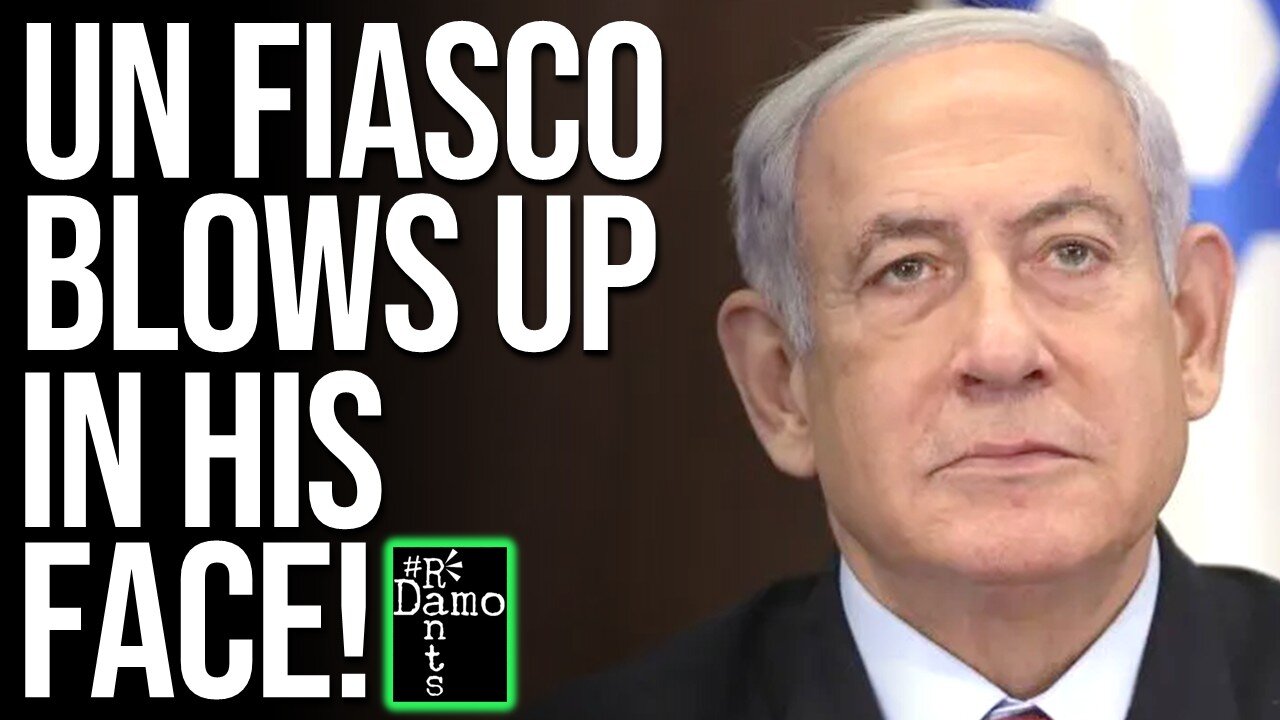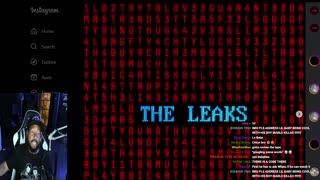Premium Only Content

Netanyahu Wanted to Bury the UN – Has He Dug Israel’s Grave Instead?
Right, so the United Nations was founded in 1945 on a solemn promise: never again. Never again would the world stand by as civilians were slaughtered with impunity. Never again would genocide unfold unchecked while the international community issued only empty words. Yet in Gaza today, after nearly 22 months of genocide, that promise has been broken in full public view. Israel’s relentless assault on the besieged enclave, described by South Africa before the International Court of Justice (ICJ) as a “plausible genocide,” has laid waste to hospitals, schools, and refugee camps. Tens of thousands are dead, hunger is being used as a weapon of war, and international law—the very system designed to prevent such horrors—lies in tatters.
The attack that most starkly exposes the depth of this crisis is not simply the bombing of civilians but the direct targeting of United Nations staff themselves now, particularly the siege of the World Health Organisation (WHO) compound in Deir al-Balah, as Israel turns its attention on previously declared Gaza safe zones, because of course there are no such thing. This is no longer merely a story of civilians left unprotected; it is the story of an organisation that cannot even defend its own personnel from this genocidal regime now. If the UN cannot uphold the law when its own agencies are under attack, then its credibility as the guardian of international law has already collapsed, but the fact it can and could have already saved itself from this actually makes matters even worse for it. So what can it do then?
Right, so as we saw yesterday, or you might have seen yesterday if you were on the right media, Israeli forces stormed the WHO’s staff residence and main warehouse in Deir al-Balah. Reports from Skwawkbox detailed how troops detained WHO staff, assaulting them, stripping, binding and interrogating them at gunpoint. Quds News Network reported that the WHO compound was hit three times in one day, destroying vital medical supplies destined for Gaza’s overwhelmed hospitals. Reuters confirmed the incident, quoting WHO officials who accused the Israeli military of deliberately targeting clearly marked UN facilities. Other reports described the simultaneous Israeli ground incursion into Deir al-Balah, where families fled in panic as tanks and bulldozers pushed deeper into the city, the scenes of destruction as aid workers scrambled to evacuate patients while Israeli forces consolidated their positions. According to Al Jazeera, at least 65 Palestinians were killed in strikes on Deir al-Balah that same day, adding to the mounting toll of a population already on the brink of famine.
This was not, as Israeli military spokespeople sometimes claim, a tragic accident of war. WHO facilities and personnel are legally protected under the 1946 Convention on the Privileges and Immunities of the United Nations and the Geneva Conventions, which guarantee the safety of medical and humanitarian workers even in active combat zones. The UN’s own records show that WHO repeatedly provided its coordinates to Israeli authorities to avoid “misunderstandings.” Yet, despite this, the compound was shelled multiple times, and staff were detained. This is not collateral damage; it is a message. Israel’s willingness to target UN agencies so openly demonstrates its contempt not only for Palestinian lives but for the entire system of international humanitarian law.
The UN’s response, however, was an even more devastating indictment. The Secretary-General’s office issued another perfunctory statement of “grave concern.” No emergency Security Council session was called. No new referral to the ICJ or the International Criminal Court (ICC) was sought. There was no coordinated demand for sanctions or even for safe passage for UN staff. In essence, the UN looked on as one of its most respected and neutral agencies was besieged. The message could not be clearer: if the UN cannot protect its own people, it cannot protect anyone.
Created in the immediate aftermath of World War II, the organisation was designed as much to maintain great-power stability as to prevent genocide. The UN Charter, particularly Article 27, grants the five permanent members of the Security Council—the United States, the United Kingdom, France, Russia, and China—veto power over any substantive resolution. This veto was not a technicality; it was the price of getting the victors of the Second World War to agree to join the organisation. But it also meant that the system was built with a fatal flaw: it could not act against the interests of those same powers or their allies.
Nowhere has this been more evident than in the United States’ use of the veto to protect Israel. Since 1948, Washington has vetoed more than 50 resolutions critical of Israel, and in the current war on Gaza, it has repeatedly blocked even the mildest calls for humanitarian access or ceasefires. In December 2023, it vetoed a resolution demanding unimpeded aid corridors, and again in March 2024, it blocked a proposal to suspend arms transfers to Israel despite overwhelming international support. The Security Council, the only UN body whose resolutions carry binding legal force, has been reduced to a bystander—not because international law lacks clarity, but because the US chooses to shield its ally.
The Secretary-General, António Guterres, does have tools to confront this paralysis, notably Article 99, which allows him to force the Security Council to consider issues that threaten international peace. But he has used this power sparingly, reportedly under heavy pressure from Western governments. The result is a political organ that documents war crimes yet refuses to enforce the law against them, exposing the UN as little more than a caretaker of statistics rather than an enforcer of international norms.
The Gaza genocide demonstrates a harsh truth: international law exists only when powerful states choose to apply it. The Genocide Convention obliges its signatories to prevent and punish genocide wherever it occurs, yet states like the US, UK, and Germany continue to arm Israel despite clear evidence of mass civilian casualties and systematic starvation. The Geneva Conventions explicitly protect humanitarian and medical workers, yet WHO staff are being detained and their facilities shelled without consequence.
The double standard is pretty blatant too. When Iraq invaded Kuwait in 1990, sanctions and military intervention followed almost immediately. When Libya was accused of targeting civilians in 2011, NATO launched a bombing campaign within weeks. But when Israel, a Western-backed state, carries out operations that have been deemed in law as plausibly genocidal, the response has been ongoing silence. This hypocrisy is not lost on the Global South, which increasingly sees the UN as a Western-dominated institution that protects its allies while condemning its rivals and they’re right because that’s how the UN was literally built.
Gaza is not the first time the UN has failed to prevent mass atrocities, but it may be the most blatant. In Rwanda in 1994, the UN ignored repeated warnings from its own commanders, allowing 800,000 people to be slaughtered in just 100 days. In Srebrenica in 1995, UN peacekeepers stood by as Bosnian Serb forces massacred 8,000 Muslim men and boys, despite the area being designated a UN “safe zone.” Both of these failures were later acknowledged as stains on the organisation’s legacy, yet the UN still acted with at least the pretence of neutrality.
What makes Gaza different is that the UN is fully aware of the atrocities—it has its own agencies on the ground reporting them daily—and yet it remains paralysed. Worse, its staff are being directly targeted. Over 200 UN employees, mostly from UNRWA, have been killed in Gaza since October 2023, making this the deadliest conflict for UN staff in history. The siege of WHO staff in Deir al-Balah is not just another failure to protect civilians; it is the UN again failing to protect itself. This, arguably, makes Gaza the organisation’s “Srebrenica moment,” the point at which its legitimacy as a guardian of international law effectively dies.
In the face of UN paralysis, a new coalition has emerged to challenge the status quo: The Hague Group. Comprised of states including South Africa, Brazil, Bolivia, Colombia, Indonesia, and Malaysia, this group is leveraging legal, economic, and diplomatic tools to hold Israel accountable. South Africa has already filed a landmark genocide case against Israel at the ICJ, while Brazil, Bolivia, and Colombia have imposed trade restrictions and arms embargoes. Malaysia and Indonesia have rallied support within the Organisation of Islamic Cooperation, pushing for coordinated action.
This activism is not merely symbolic; it reflects a broader shift in global power dynamics. The Global South is no longer willing to defer to Western-controlled institutions which keep on failing, and The Hague Group’s willingness to act independently suggests that an alternative approach to international justice is emerging. The critical question for them now is whether this group can go beyond sanctions and legal filings to force real political consequences for Israel.
The most powerful tool available to the UN General Assembly, that they have chosen not to use and is becoming more and more inexcusable is the Uniting for Peace resolution (GA Resolution 377 A (V)), adopted in 1950 to bypass Security Council vetoes. When the Security Council fails to act due to a veto, the General Assembly can convene an emergency session within 24 hours to recommend collective measures, including sanctions, arms embargoes, and even military action. This mechanism has been used 11 times, most famously in 1956 to force Britain, France, and Israel to withdraw from Egypt during the Suez Crisis, and in the 1980s to impose sanctions on apartheid South Africa despite Western reluctance, much as we’re seeing them doing now.
The matter of which member could trigger such a mechanism is largely conjecture of course, but certainly there are standout potential candidates. South Africa, having already demonstrated leadership at the ICJ, could submit a formal request. Between the African Union, OIC, BRICS-aligned states, and much of Latin America, the coalition could easily secure the two-thirds majority needed to pass a resolution in theory. While such a resolution would not be legally binding, it would carry immense political and moral weight, providing legal cover for states to impose sanctions, sever diplomatic relations, or even organise humanitarian convoys to break the Gaza blockade.
If the UN fails to act, the world may move toward a post-UN system of global governance, much as we saw after it’s predecessor, the League of Nations fell and the same weaknesses that did the League in are visible with the UN too – power states refusing to act outside their own self interest and an organisation that couldn’t enforce legally binding statutes. The Hague Group’s actions suggest that regional and independent mechanisms are already being developed. BRICS, for example, could establish its own tribunal for war crimes or coordinate sanctions independently of the UN. China and Russia, while not formally part of The Hague Group, may support such initiatives as a way to weaken Western dominance of international institutions.
The UN, in this context, risks becoming a relic, respected for its humanitarian agencies but irrelevant as a political actor. Gaza may be remembered not only as the site of genocide but as the moment the Global South began building a new system of international law—one that does not rely on the approval of Washington, London, or Paris.
The siege of WHO staff in Deir al-Balah is not just another episode in the long history of UN failures; it is a symbol of the organisation’s collapse as a credible force for justice. Israel’s message was clear: the UN has no authority here. And by failing to act, the UN confirmed it.
Yet all hope for accountability is not lost. The rise of The Hague Group, the potential use of Uniting for Peace, and the growing defiance of the Global South suggest that a new era of international justice may be dawning—one that does not wait for permission from those who have turned international law into a tool of navel-gazing and power politics. I don’t believe this WHO attack will shift the UN one iota and more and more people will end up asking themselves what is the point of you when you were set up to make sure what happened once never happens again and here you are watching it happen again. If justice comes for Gaza, it will not be because of the UN; it will be because the world finally moved beyond it.
It isn’t just the UN that is self immolating over Gaza and Israel right now either, the EU has made just as much of a mockery of itself in this regard this past week as well, trying to lean on Iran with sanctions if they don’t resume nuclear program talks, whilst opting to give Israel a free pass in a move that Israel has taken to mean endorsement of what they are doing in Gaza. Get all the details of that farce in this video recommendation here as your suggested next watch.
Please do also hit like, share and subscribe if you haven’t done so already so as to ensure you don’t miss out on all new daily content as well as spreading the word and helping to support the channel at the same time which is very much appreciated, holding power to account for ordinary working class people and I will hopefully catch you on the next vid. Cheers folks.
-
 1:39:16
1:39:16
The HotSeat
14 hours ago👉 STOP Blaming Each Other — Look at the Media!
24.7K25 -
 22:34
22:34
The Pascal Show
10 hours ago $0.98 earnedFEDERAL CHARGES?! Iryna Zarutska's Attacker Gets Hit With Federal Charges After Fatal Train Attack
7.57K9 -
 LIVE
LIVE
Lofi Girl
2 years agoSynthwave Radio 🌌 - beats to chill/game to
197 watching -
 13:05
13:05
Mike Rowe
4 days agoIs College DEAD? Inside America’s #1 Trade School | Sheree Utash From #448 | The Way I Heard It
78.6K27 -
 3:01:13
3:01:13
FreshandFit
6 hours agoAyesha Curry Never Wanted Steph Curry
65.8K11 -
 23:28
23:28
DeVory Darkins
11 hours ago $11.49 earnedTrump official ANNIHILATES Democrats in heated debate as CNN gets caught sympathizing with criminals
26K73 -
 1:02:26
1:02:26
The Nick DiPaolo Show Channel
13 hours agoPOC Murders Another White Woman | The Nick Di Paolo Show #1790
61K77 -
 2:04:29
2:04:29
Inverted World Live
9 hours agoNew UFO Hearing Testimony: Lockheed Martin Has Alien Technology | Ep. 105
72.3K8 -
 5:00:59
5:00:59
Akademiks
7 hours agoYNW Melly MIGHT BE COOKED! Co-D TELLLING? 6ix9ine vs Young Thug . Drake vs Kaicenat? HOLLY
36.5K2 -
 4:46:45
4:46:45
Drew Hernandez
13 hours agoHORRIFYING: FULL FOOTAGE OF IRYNA ZARUTSKA MURDER HAS BEEN RELEASED
38.3K38